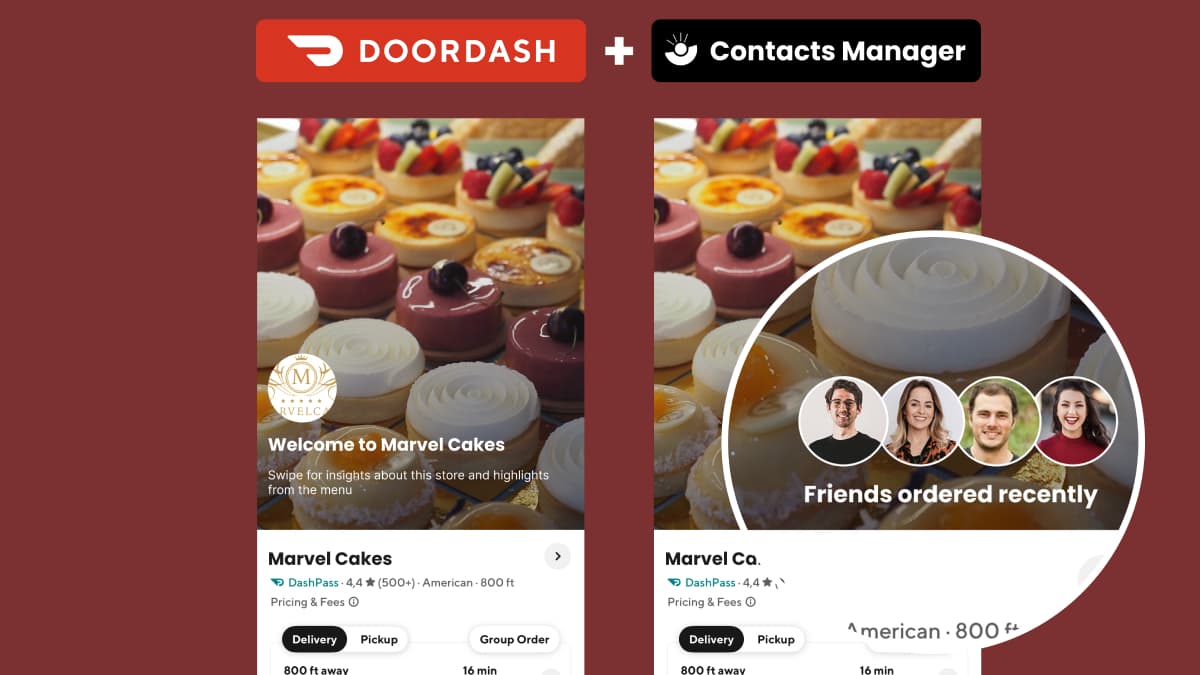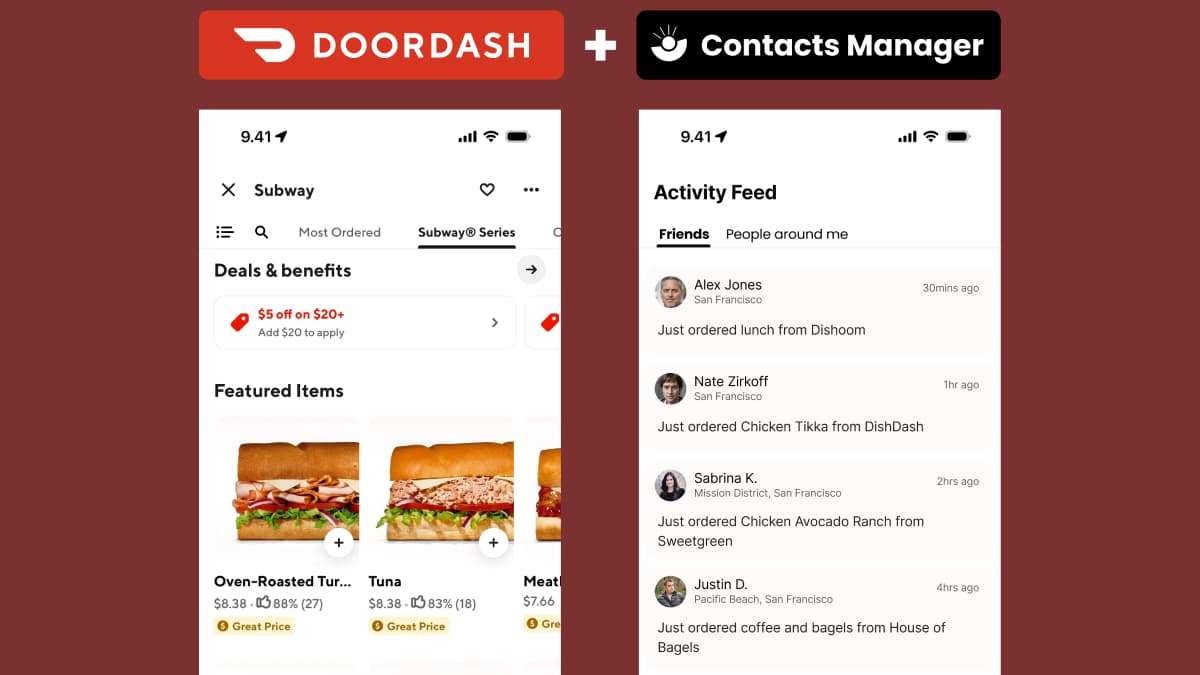

Making DoorDash Social: How Food Delivery Becomes a Community Experience
Imagine opening DoorDash and seeing "John, Alex, and Sarah also ordered from Dishoom today" with their friendly avatars smiling back at you. Suddenly, that unfamiliar restaurant doesn't feel so risky anymore. Your friends' choices become your social proof, transforming a solo food decision into a community-driven experience.
This is the power of social integration in food delivery—and it's exactly what we'll explore in this case study of how DoorDash could leverage ContactsManager SDK to create a more engaging, trustworthy, and profitable platform.
The Current State: Anonymous and Isolated
Today's food delivery experience is fundamentally lonely. Users scroll through endless restaurant options, relying on anonymous reviews from strangers and star ratings that may or may not reflect their personal taste preferences. The decision-making process is often anxiety-inducing, especially when trying new places.
Consider Sarah, a marketing manager in San Francisco. She opens DoorDash every Tuesday for lunch, staring at the same overwhelming list of 200+ restaurants within delivery range. She's paralyzed by choice, often defaulting to the same three safe options she's ordered before. The anonymous "4.2 stars (342 reviews)" doesn't tell her if the spice level will be right for her, or if the portion sizes match her expectations.
This isolation creates several problems for both users and DoorDash:
User Experience Issues
- Decision paralysis: Too many options without personal context
- Trust concerns: Relying on anonymous reviews from unknown tastes
- Missed discoveries: Users stick to familiar choices rather than exploring
- Social disconnect: No way to share the experience with friends
Business Impact
- Lower conversion rates: Users abandon the app when overwhelmed by choices
- Reduced order frequency: Anxiety around trying new places limits ordering
- Missed upselling opportunities: Users order conservatively when uncertain
- Limited viral growth: No natural sharing mechanisms built into the experience
The Vision: DoorDash as a Social Dining Platform
By integrating ContactsManager SDK, DoorDash could transform into a social dining platform where every order becomes an opportunity for connection, discovery, and community building.
Core Social Features Implementation
1. Friends' Activity Feed

The Feature: See what your friends have ordered recently, with opt-in sharing.
swiftContactsManager SDK// Get friends' recent food delivery activity let cm = ContactsService.shared let friendsActivity = try await cm.socialService.getFeed( matching: .following, eventType: .order, skip: 0, limit: 10 ) for event in friendsActivity.events { // Display: "Alex ordered from Sushi Time 2 days ago" }
User Benefit: Instead of scrolling through 200 options, Sarah now sees that her friend Mike ordered amazing Thai food from a place she's never tried. This turns overwhelming choice into curated recommendations from trusted friends.
Possible Wins: Users are more likely to try new restaurants, feel confident in their choices, and share their experiences, leading to higher engagement and more organic growth.
2. Restaurant Social Proof

The Feature: Display which of your contacts have ordered from each restaurant, creating instant trust and familiarity.
Implementation:
swiftContactsManager SDK// Get social proof for a restaurant let cm = ContactsService.shared let socialProof = try await cm.social.getFollowers( userId: "restaurant-id", limit: 5 ) for follower in socialProof.followers { // Display: follower.displayName, avatar, and recent order info }
User Experience:
- Restaurant listings show "3 friends ordered here recently" with profile pictures
- Detailed view shows "Mike loved the Chicken Tikka" and "Sarah ordered this 5 times"
- Trust badges like "Popular with your network" for frequently ordered spots
Objective: Build trust and reduce decision anxiety by showing real, relevant social proof. This can help users feel more confident trying new places and increase the likelihood of positive experiences.
3. Real-Time Friend Notifications
The Feature: Notifications when friends order from interesting places, creating spontaneous social moments.
User Experience:
- "Alex just ordered from Salt & Straw! They have a new seasonal flavor today"
- "3 of your friends ordered from Souvla this week - trending in your network!"
- "Mike is ordering Thai food - want to add to his order for free delivery?"
A simple webhook handler can power real-time notifications:
pythonContactsManager SDK# Example: Handle real-time notifications via webhook @app.post("/webhooks/contactsmanager") async def webhook_handler(request: Request): payload = await request.json() event_type = payload.get("event") if event_type == "user.create_event": # Notify users about a friend's new order or activity pass
Possible Wins: Timely notifications can spark group orders, encourage users to try trending spots, and create a sense of community around food discovery.
4. Follow Your Favorite Restaurants
The Feature: Follow restaurants to get updates about new menu items, special events, or when your friends order there.
Implementation:
swiftContactsManager SDK// Follow a restaurant let cm = ContactsService.shared let response = try await cm.social.follow(userId: "restaurant-id")
User Experience:
- Follow notification: "Salt & Straw added Brown Butter Cinnamon flavor!"
- Friend activity: "Sarah ordered the new seasonal flavor you've been following"
- Event alerts: "Chez Panisse is offering a special tasting menu this weekend"
Objective: Keep users engaged with their favorite restaurants and encourage repeat orders by surfacing relevant updates and friend activity.
The Competitive Advantage
While competitors focus on delivery speed and restaurant selection, DoorDash's social integration would create a unique moat through network effects lock-in. When users' social dining data and friend connections are established, switching platforms becomes much less attractive.
This is a key reason why platforms like Yelp and Google Reviews, despite being feature-rich, can't easily be displaced: their value grows as more people contribute and connect. In contrast, ride-sharing platforms like Uber and Lyft are now facing disruption from Waymo in San Francisco, where a more reliable service is winning market share—but there is no network lock-in, so users can easily switch.
A social food delivery platform with strong network effects can stand tall, even as new competitors emerge, because the value of the network itself becomes the primary differentiator. The more friends and trusted reviews a user sees, the more likely they are to stay, recommend, and engage.
Conclusion: The Future of Food is Social
Food has always been social—we eat with family, dine with friends, and share meals to build community. DoorDash's current platform strips away this fundamental human element, reducing rich culinary experiences to anonymous transactions.
By integrating ContactsManager SDK, DoorDash could reclaim the social nature of dining while maintaining the convenience of delivery. The result would be a platform that doesn't just deliver food—it delivers community, discovery, and connection.
The opportunity is massive: transform DoorDash from a utility into a social platform, increase user engagement and retention, and create new revenue streams through premium social features. Most importantly, make every meal a chance to connect with the people who matter most.
Ready to make your food delivery app social? Contact our team to discuss how ContactsManager SDK can transform your platform into a community-driven experience.
This case study represents a hypothetical implementation. DoorDash is a trademark of DoorDash Inc. and is not affiliated with ContactsManager.